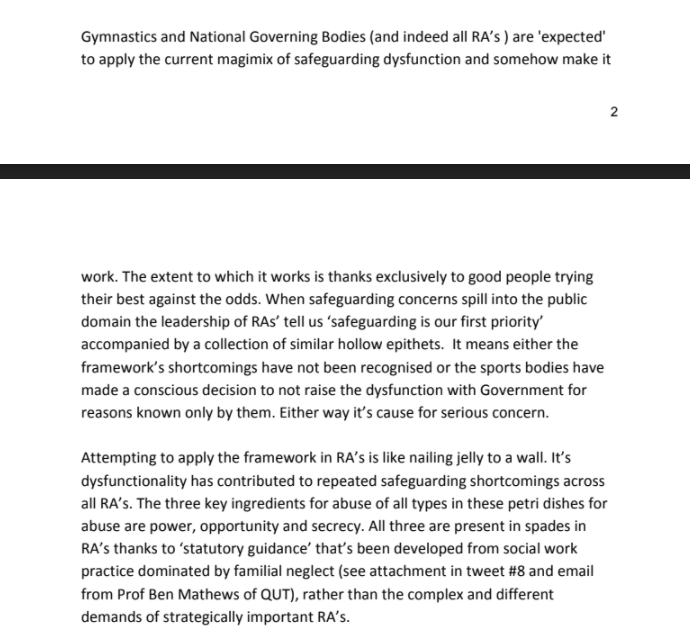It is hoped the Whyte Review reveals abuses and safeguarding shortcomings within gymnastics and makes appropriate recommendations. That said it’s important to appreciate the limitations of such reviews. Unlike a statutory inquiry no clubs or coaches can be compelled to provide evidence. Recommendations Anne Whyte QC makes might or might not be adopted by the sports body in question. Those that are adopted then have to be delivered, sustained and enforced by the very organisations under whose umbrella the shortcomings occurred. We highlight some further challenges below and hope when it concludes that British Gymnastics will publish annual safeguarding data to evidence how the review has impacted safeguarding and to give parents of future gymnasts the confidence to enrol their children in the sport.
Here is some background …..
Safeguarding in England and Wales
The sexual and physical abuse of a child, or neglect, is not a reportable offence in either England, Wales or Scotland despite child sexual abuse being a crime in all jurisdictions. Bullying, emotional or verbal abuse, like sexual abuse currently, can only be addressed by ‘guidance’ which is unenforceable.
To the extent athletes are safeguarded in these settings, which are legally defined as ‘Regulated Activities’ (“RA”), it is thanks to good staff trying their best against the thicket of unenforceable safeguarding ‘guidance’ on which no reliance can be placed. The absence of a reliable safeguarding framework provides those with an unhealthy attitude/interest in the young carte blanche to continue their behaviour. If abuse enters a setting (club) it can become normalised. The individual in a club or institution (RA see definition below) who has ‘statutory responsibility’ for safeguarding is the head of it i.e. the Chair or the owner. If a person working in an RA fails to report known or suspected sexual/ physical abuse and that incident is subsequently discovered, often years after the later when the victim manages to speak, no one can be held to statutory account for failure to report because no law has been broken.

This was the first time government admitted in print that there is no law requiring professionals who work with children to report child abuse.
Sport appears disconnected from its safeguarding responsibilities. Underpinning this assertion is the startling fact that not one sports governing body or club made a submission to the consultation shown in the graphic above despite reporting of abuse being a key component of functioning safeguarding in all RA’s. Pleasingly three sports academics, each with significant presence in safeguarding , asked to have their names appended to our submission which is available here in full .
If abuse isn’t reported to an agency independent of the setting how can it be stopped? Government knows this but fails to address the shortcoming for reasons that have nothing to do with safeguarding. Instead it spends money virtue signalling – here’s an example. Government adverts broadcast on national independent radio stations for 18 months were directed towards Regulated Activities including sport. Yet reporting abuse remains a discretionary ‘expectation’ on those who work in RA’s. England, Wales and Scotland are out of step with the majority of jurisdictions in the rest of the world.
What is Regulated Activity ?
In broad terms coaches and supporting personnel who have responsibility for the care of children within a setting are defined as Regulated Activities by the poorly drafted Safeguarding Vulnerable Groups Act 2006. The Act was weakened from its already poor starting point by amendments in the Protection of Freedoms Act 2012 when two well-known peers from sport unsuccessfully objected to the changes.
What value safeguarding reviews and inquiries ?
To weathered observers most inquiries / reviews deliver little. Let’s not forget recommendations stemming from them are for the consideration of the institution’s executive. Whether any or all are adopted, effectively applied and enforced is in the gift of the institution. IICSA, the statutory inquiry, can only make recommendations for the government to consider. Here is a short and sharp link to the profoundly limp IICSA recommendations for the Anglican Church. Many of the Anglican abusees are understandably disappointed because the recommendations rely on the leopard voluntarily changing its spots. The Dame Janet Smith review on child abuse at the BBC failed in many areas for perfectly identifiable reasons that we detailed in this review. It was a similar story with the review of safeguarding in NHS settings following Savile’s abuses which we reviewed here.
In summary these exercises are an example of the mountain groaning and giving forth a mouse.
Whyte Review Terms of Reference
The Terms of Reference is the first place to visit to appreciate scope of the Review. Such were our concerns we sent a submission.
The first paragraph distils our concern.
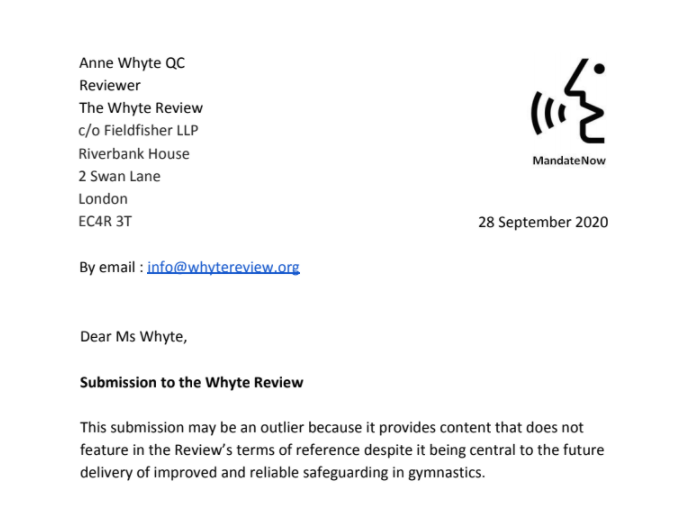
Our letter then introduced Mandate Now citing the reviews to which we have contributed and on what subject. Incidentally this included the long awaited review commissioned by the Football Association which is chaired by Clive Sheldon QC. We then explained our concerns ……..
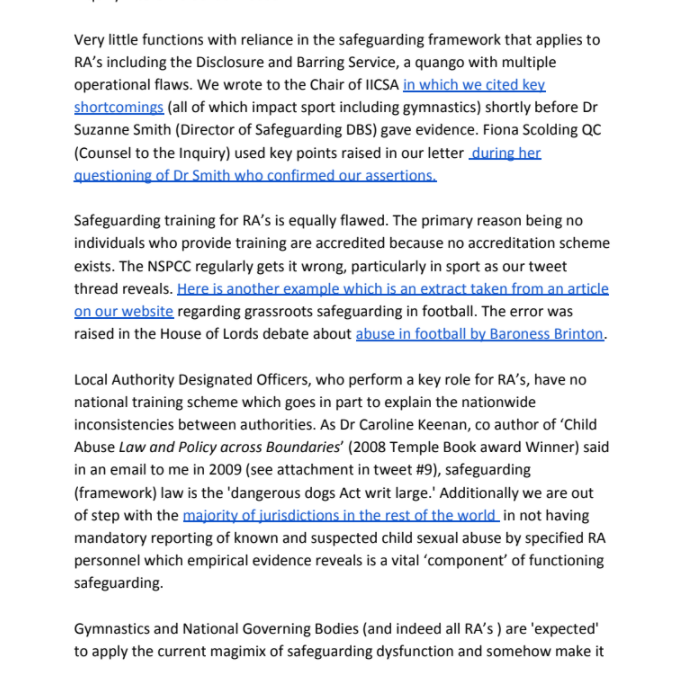
The links in the letter are provided in the bullet list below each extract in this article.
- Cited shortcomings
- Questioning of Dr Smith
- Article extract
- Baroness Brinton
- Majority of jurisdictions in rest of the world
- Tweet #8 is here. Professor Ben Mathews is pre-eminent in the field of safeguarding law.
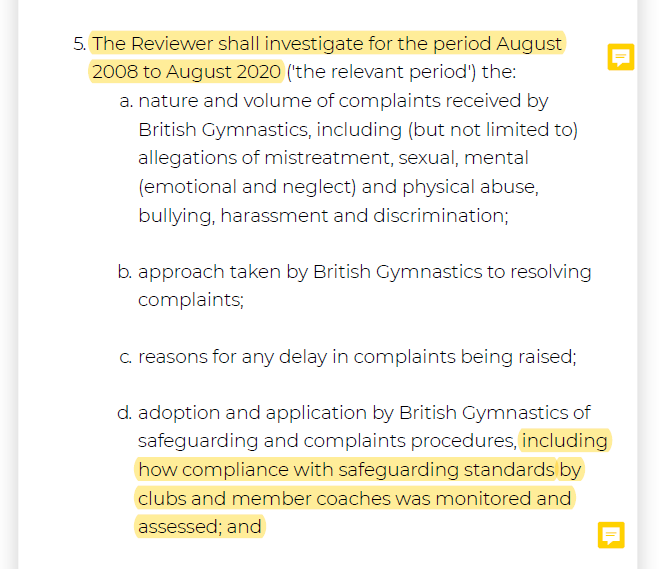
Terms of Reference para 5 is deeply concerning. Compliance with safeguarding standards grounded on the current framework that cannot be made to function reliably because of the absence of law is untenable. But there is a further concern in para 6 of the ToR’s.
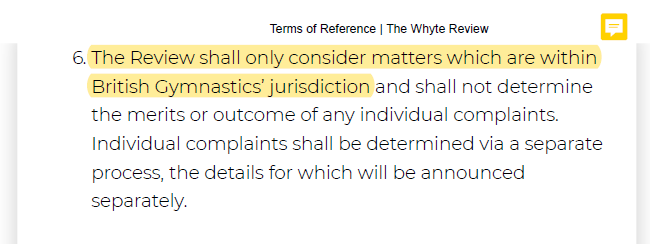
Para 6 seemingly excludes the Review from considering the extent to which the safeguarding framework inhibited or facilitated the reporting of sexual abuse in gymnastics. Our submission below clearly sets out our concern.
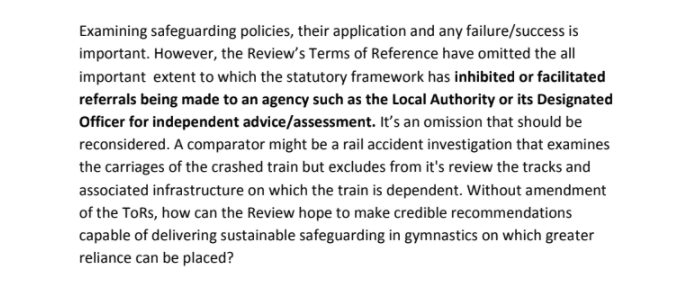
In contrast to the abovementioned omission the Telford Child Sexual Exploitation Inquiry which has just closed for submissions, chaired by Tom Crowther QC, is considering precisely what we assert the Whyte Inquiry must also consider.
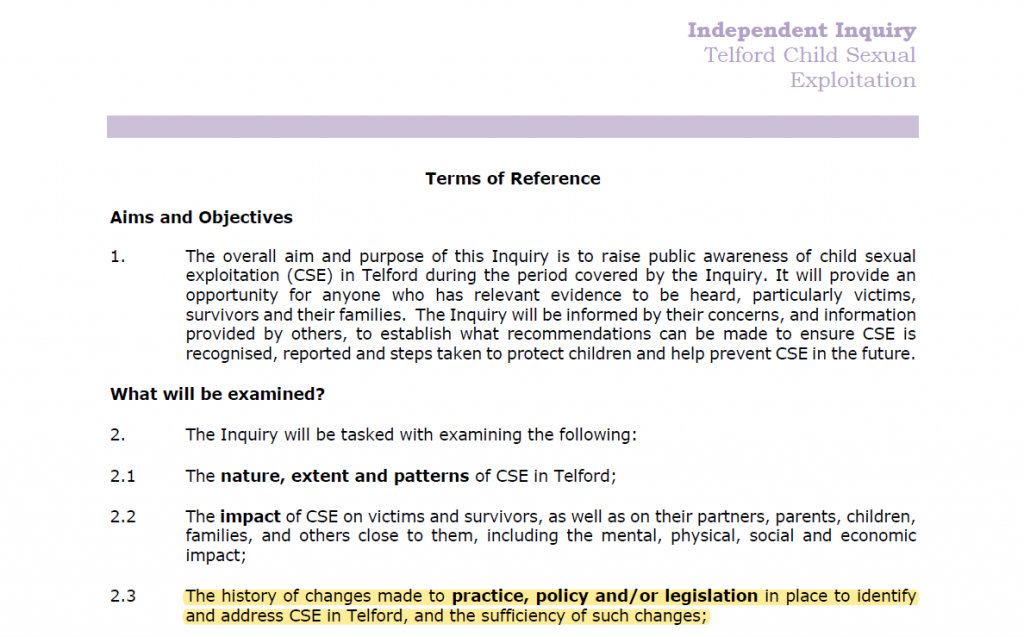
Our letter continues ….
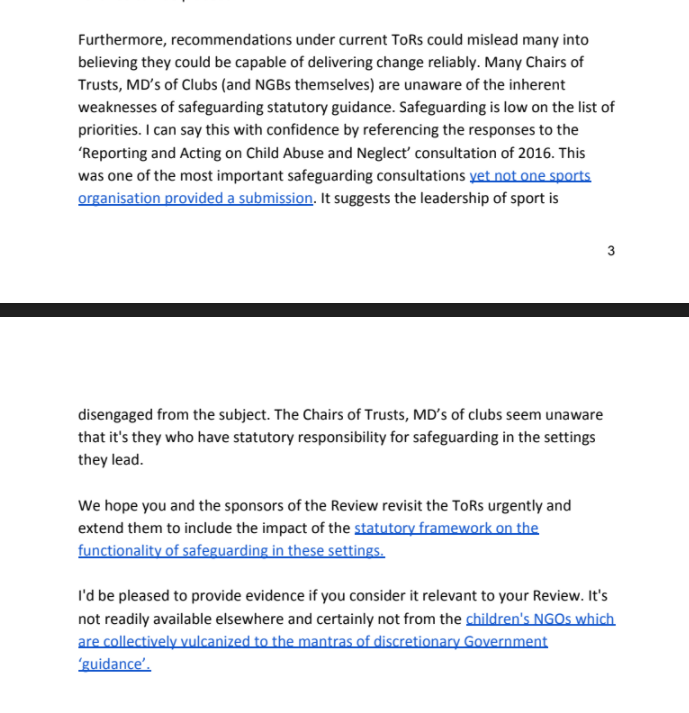
The last link in this final extract from our letter crystallises the jaw-dropping safeguarding dysfunction in RA’s in England and Wales. The Youth Justice Board is a quango with line management to the Ministry of Justice. It is also substantially funded by the Department for Education which is responsible for safeguarding. Here is the link and we’d draw your attention to the highlighted paragraph.
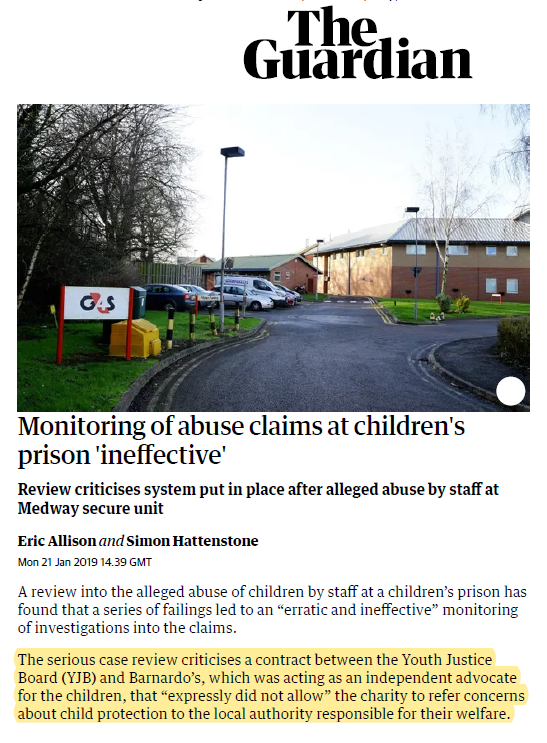
Barnardo’s broke no law when agreeing to this arrangement. It was part of a multi-million pound contract with Youth Justice Board which has recently been renewed with the NGO. For the sake of even-handedness here was the NSPCC’s position on reporting child abuse in 2014. It now claims it supports mandatory reporting in a very limited number of RA’s (not sport). However the proposal is counterfeit with no operating precedent that we can find anywhere in the world. We reviewed its submission to the Government consultation here: Government Secures NSPCC Support for Child Protection Proposal Designed to Fail
Referrals
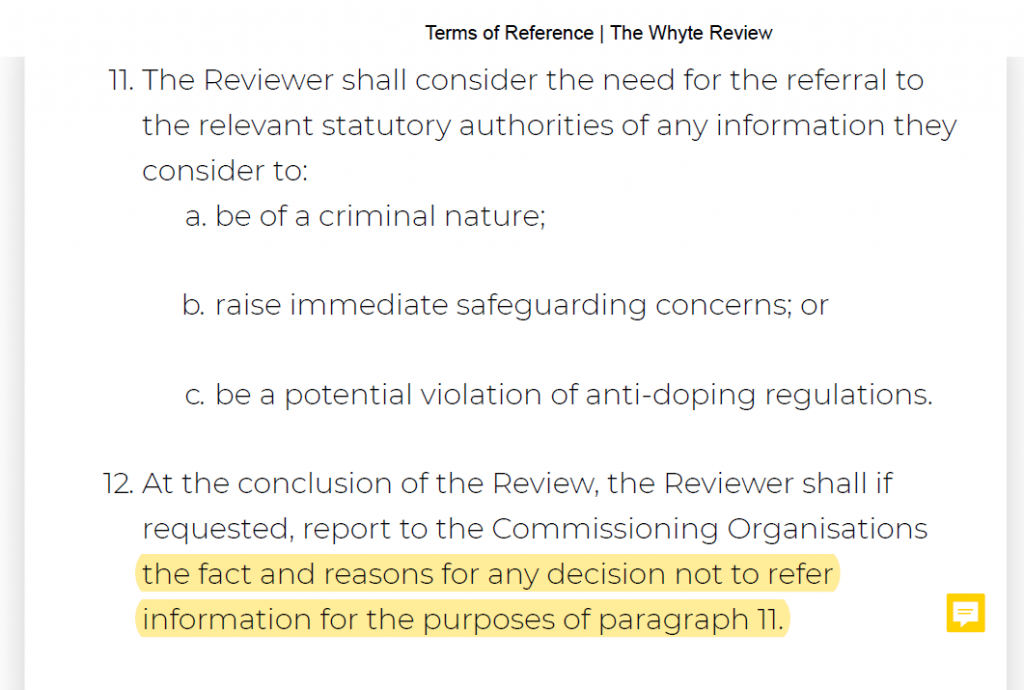
Paragraph 12 is discretionary reporting crystallised.
‘Independent’ review
This adjective is attached to all safeguarding reviews. The extent to which the Whyte Review is independent features in Para 10 :
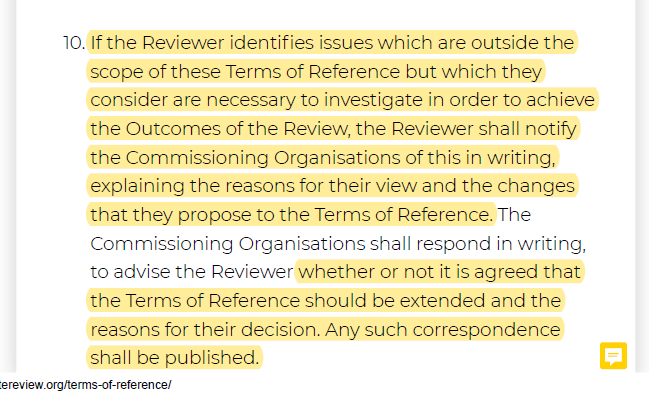
IICSA which is also ‘independent‘ is funded by the Home Office. Coincidentally civil servants from the department hold the command and control positions within the Secretariat.
Safeguarding recommendations from all similar inquiries in England, Wales and Scotland are grounded on the absence of law that requires known and suspected abuse to be reported to the Local Authority or police for independent assessment. This shortcoming poleaxes functioning safeguarding in these complex and strategically important settings. Here’s additional opinion from a different source.
The safeguarding framework for RA’s is a bag of bits. Until the current framework is overhauled any claim that safeguarding in Gymnastics is working is just fantasy. That’s why the Whyte Review’s Terms of Reference need to be revisited.
